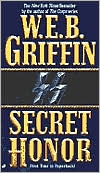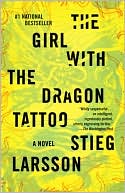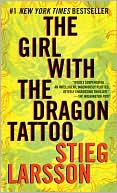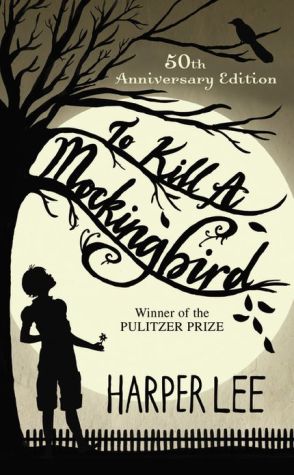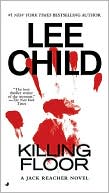Secret Honor (Honor Bound Series #3)
In Wolf's Lair, a German general works toward the assassination of Adolf Hitler. In Buenos Aires, the general's son, code-named Galahad, falls under suspicion by the SS after a Nazi operation suddenly goes bad. In the middle of it all is OSS agent Cletus Frade, who knows the identity of father and son and what they will do... if they can survive that long. For not only are SS and Abwehr officers hot on their trails in both countries, but the OSS has branded Frade a rogue agent and is...
Search in google:
In Wolf's Lair, a German general works toward the assassination of Adolf Hitler. In Buenos Aires, the general's son, code-named Galahad, falls under suspicion by the SS after a Nazi operation suddenly goes bad. In the middle of it all is OSS agent Cletus Frade, who knows the identity of father and son and what they will do... if they can survive that long. For not only are SS and Abwehr officers hot on their trails in both countries, but the OSS has branded Frade a rogue agent and is determined to shake the truth from him, at whatever cost. If Frade can't figure a way to hold them all off, then the futures of all three men may be very short indeed....Publishers WeeklyThis third entry in the military/espionage Honor Bound series, focusing on the Argentine-German connection during WWII, will intrigue newcomers and have Griffin's long-time fans queuing up for the next installment. In 1943, the Nazi-ordered assassination of Jorge Frade, the anti-Axis president of Argentina, has left the country in a tense mood, which is exacerbated by the murder of two Nazi officers during a night beach landing, part of the top-secret Nazi Operation Phoenix. The aborted mission was crucial to a plan to free the Argentine-interned crew of the Nazi ship Graf Spee, but it turns out that the slain officers had also extorted ransom money from Jews in concentration camps and arranged for their passage to Argentina--without the Reich's knowledge. Cletus Frade, the 24-year-old American-reared son of the slain president, has returned to Argentina as heir to his father's vast estates and financial holdings. But Cletus is also an OSS (CIA precursor) agent, and a chance meeting with Major Hans-Peter von Wachstein, a Nazi pilot attached to the German embassy, results in their friendship. Peter feeds secrets to Cletus in exchange for help in moving Peter's family's funds to Argentina, where they hope to live after the war that he and his father (a close aide to the Fuhrer) believe is wrong and already lost. When Himmler launches an investigation to find the embassy spy who scuttled Operation Phoenix, Cletus struggles to protect Peter's identity and deal with the rising power of pro-Axis Juan Peron. Griffin adroitly shifts among German, American and Argentinian cultural milieux and fills the plot with believable romance, intrigue and diplomatic fencing, while capturing the horrors of war and the crucial role of intelligence agents. He nicely explains the Reich's need for Argentina as safe harbor to replenish its U-boats and to stash funds for postwar Nazi emigration. What will happen to the SS, Cletus and the surviving cast promises an equally exciting sequel. (Jan.) Copyright 1999 Cahners Business Information.
\ \ \ \ Chapter One\ \ \ [ONE]\ Near Sidi Mansour, Tunisia\ 1530 7 April 1943\ \ \ \ A solitary Afrika Korps staff car—a small Mercedes convertible sedan—moved as quickly as it could across the desert. It had of course been painted in the Afrika Korps desert scheme: tan paint mimicked the color of the Tunisian desert, and crooked black lines on the hood and doors were intended to break up the form of the vehicle and make it harder to spot at a distance.\ Nothing could be done, however, to keep the dust of the Tunisian desert road from boiling up beneath the wheels of the Mercedes and raising a cloud scores of feet into the air. If anyone was looking, the dust cloud formed an arrow pointing to the Mercedes.\ And someone was looking—an American pilot in a P-51 Mustang.\ The North American P51-C and -D aircraft used in the North African campaign were powered by a Packard version of the British Merlin engine. They had a top speed of 440 knots, and were armed with four .50-caliber Browning machine guns. Hardpoints in the wings permitted the use of droppable auxiliary fuel tanks and could also be used to carry 1,000-pound bombs.\ Even at 500 feet and an indicated airspeed of 325 knots, it hadn't been hard for Captain Archer C. Dooley, Jr., U.S. Army Air Corps, to spot the boiling dust and then the Afrika Korps staff car that had caused it.\ "Oh, shit!" Captain Archer Dooley, Jr., said sadly.\ Finding a Kraut staff car running unprotected across the desert did not please him. Whenyoung Archie Dooley first signed up to fly fighter aircraft, he expected to become a "Knight of the Sky"—flying mano a mano against other knights of the sky. He didn't expect to be killing people like cockroaches.\ \ \ Fifteen months before, Archie Dooley had been the valedictorian of the 1942 class at St. Ignatius High School in Kansas City, Kansas. Six weeks before, he had been Second Lieutenant Dooley. He had come to Tunisia fresh from fighter school, looking forward to sweeping Nazi Messerschmitts from the skies with the four .50-caliber Brownings in the wings of his Mustang, much as Errol Flynn had swept the Dirty Hun from the skies over France in World War I in Dawn Patrol.\ After which, with a little bit of luck, there would be a girl in the Officers' Club with an exciting French accent, long legs, long hair, and firm breasts, who would express her admiration for a Knight of the Sky in a carnal fashion.\ It hadn't turned out that way.\ For one thing, by the time Archie got to the squadron, the Allies had attained air superiority over the enemy. In other words, no German or Italian aircraft were left to be swept from the skies.\ The day Archie reported in, the squadron commander had informed him that the 23rd Fighter Group had ordered the squadron to be engaged in ground support. That broke down into two missions: The first was to attack the enemy in front of American infantry and armor with either wing-mounted bombs or the .50-caliber Brownings. The second was reconnaissance and interdiction. This meant flying over enemy-held desert to see what you could see, and to interdict — which meant to shoot up — anything you found.\ Second Lieutenant Archer Dooley, Jr.'s, first mission had been to fly wingman to the squadron commander on a two-plane reconnaissance and interdiction mission. At first, that had been sort of exciting ... even fun.\ They had raced across the desert close to the ground at better than 300 knots, a maneuver flatly forbidden in flight school. Here it was perfectly acceptable.\ Like drinking in the Officers' Club, even if you were a long way from being old enough to vote.\ They had come across a railroad engine, puffing along tracks in the desert, dragging a line of boxcars. The squadron commander had signaled to Archie that they should engage the target. "Take the locomotive," he had ordered. "I'll get the boxcars."\ Second Lieutenant Archer Dooley, Jr., had gotten the locomotive, enjoying the sight of his one-tracer-round-in-five stream of .50-caliber projectiles walking across the desert, and—as he raised the Mustang's nose just a hair—moving into the locomotive's boiler.\ As he flashed over the locomotive, the locomotive had blown up. His first kill. Then there was a ball of fire, from which rose a dense black cloud of smoke.\ As Archie pulled up to make a second run at the train, he realized that the ball of fire was several hundred yards from the railroad tracks. What else had they hit, he wondered, even by mistake, that had exploded like that?\ Then, as he lowered the Mustang's nose for his second run, taking care not to collide with the squadron commander's Mustang, he realized that the squadron commander's Mustang was no longer in sight.\ And then he realized what the ball of fire really was.\ At the time, it seemed probable that the squadron commander had been hit by ground fire. The squadron commander had told him that some of the trains were armed with antiaircraft machine guns and light cannon. mounted on flatcars. Because his attention had been fixed on the locomotive, Archie hadn't noticed anything on the cars behind it.\ That night, at the Officers' Club (empty, as always, of females—long-legged, firm-breasted, or otherwise), he learned about the Group's promotion policies: Everybody got to be a first lieutenant after eighteen months of commissioned service, which meant he had about ten days before that happened.\ There were two ways to get to be a captain. If you lived to serve twelve months as a first lieutenant, then promotion was automatic. But promotion came a lot quicker in another circumstance. The senior first lieutenant was the squadron executive officer (senior, that is, in terms of length of service in the squadron, not date of rank). If the squadron commander got either killed or seriously injured (defined as having to spend thirty days or more in the hospital), then the Exec took the Old Man's job and got the captain's railroad tracks that went with it.\ Four weeks and six days after Archie reported to the squadron, the squadron first sergeant handed him a sheet of paper to sign:\ He hadn't gotten to work his way up to executive officer. The young man who had become the Old Man and the Exec had both gone in on the same day, the Old Man when his Mustang ran into a Kraut antiaircraft position that had gotten lucky, and the Exec when he banked too steep, too low to the ground and put a wing into the desert.\ That left Archie as the senior first lieutenant in the squadron.\ The colonel had driven over from Group in a jeep, told him to cut orders assuming command, and handed him two sets of railroad tracks, still in cellophane envelopes from the quartermaster officer's sales store.\ Archie had pinned one set of captain's railroad tracks over the embroidered gold second lieutenant's bars still sewn to the epaulets of his A-2 horsehide flight jacket, and put the other set in the drawer of the squadron commander's — now his — desk. If he ever had to go someplace, like Group, he would pin the extras on his Class A uniform then.\ Being a captain and a squadron commander was not at all like what he'd imagined. A lot of really unpleasant shit went with being the Old Man. Like writing letters to the next of kin.\ He hadn't actually had to compose these, thank God. There were letters in the file that some other Old Man had written, full of bullshit about how your son/husband/brother/nephew died instantly and courageously doing his duty, and how much he would be missed by his fellow officers and the enlisted men because he had been such a fine officer and had been an inspiration to all who had been privileged to know him.\ Not the truth, not about how he'd tried to bail out but had been too close to the ground and his 'chute hadn't opened; not that he'd been seen trying and failing to get out of the cockpit through a sheet of flame blowing back from the engine; not about how he'd tried to land his shot-up airplane and blew it, and rolled over and over down the runway in a ball of flame and crushed aluminum. Or that they really didn't know what the fuck had happened to him, he just hadn't come back; and later some tank crew had found the wreckage of his Mustang with him still in the cockpit, the body so badly burned they couldn't tell if he had been killed in the air or died when his plane hit.\ He didn't have to type the letters, either. The first sergeant just took one from the file and retyped it, changing the name. But Archie had to sign it, because he was now the Old Man and that's what was expected of him.\ And he was always getting bullshit pep talks from some major or light colonel at Group that he was supposed to pass down the line.\ Like what he remembered now, staring down at the Kraut staff car:\ "Dooley, what interdiction means is that you and your people are supposed to engage whatever you come across, like one fucking Kraut with a rifle, one motorcycle messenger, not pass him by to go looking for a railroad locomotive, or something you think is important, or looks good when you blow it up. The motorcycle messenger is probably carrying an important message. Otherwise he wouldn't be out there. You take out a Kraut staff car, for example, you're liable to take out an important Kraut officer. Interdict means everything that's down there. You read me. Captain?"\ "Yes, Sir."\ "And pass the word to your people, and make sure they read you, and read you good."\ "Yes, Sir."\ And Archie had passed the word, and gotten dirty looks.\ And now there was a Mercedes staff car down there, and it wasn't like being in a dogfight, it was like running over a dog with your car; but you had to do it because you had told your people they had to do it, and Archie believed that an officer should not order anybody to do what he wouldn't do himself.\ Archie banked his Mustang steep to the right, lined up on the cloud of dust boiling out under the wheels of the Mercedes, and when he thought he had him, closed his finger on the trigger on the joystick. When he saw his tracer stream converge on the Mercedes and he didn't have to correct, he thought he was getting pretty good at this shit.\ The Mercedes ran off the road, turned over, and burst into flames. Maybe a couple of bodies had flown out of the Mercedes, but Archie couldn't be sure, and he didn't go back for a second look, because if he did and saw somebody running, he wasn't going to try to get him.\ He leveled off at about 500 feet and started looking for something else to interdict.\ \ \ And at 2105 hours that night, at Afrika Korps General Hospital #3, near Carthage, Tunisia, the chief surgeon and hospital commander, Oberst-Arzt (Colonel-Doctor) Horst Friederich von und zu Mittlingen, pushed his way through the tent flap of the tent euphemistically called "Operating Theater Three" and reached beneath his bloodstained surgical apron for a package of cigarettes.\ The hospital's name implied something far more substantial than the reality. General Hospital #3 (which served the Tenth Panzer Division) was a sprawling collection of tents and crude sheds, most of them marked with red crosses to protect against bombing or strafing. The tents served as operating theaters, the sheds as wards. Both were covered with the dust raised by the trucks and ambulances — and sometimes horse-drawn wagons — bringing in the wounded and dying.\ Von und zu Mittlingen was a fifty-two-year-old Hessian trained at Marburg and Tübingen. Before the war, he had been professor of orthopedic surgery at St. Louise's Hospital in Munich.\ The cigarettes were Chesterfields. One of the nurses, who didn't smoke but knew the Herr Oberst-Artz did, had taken them from the body of an American pilot who had survived the crash of his fighter plane but had died en route to Afrika Korps General Hospital #3. The lighter, too, was American, a Zippo, found on the floor of one of the surgical tents. There had been no telling how long it had been there, or to whom it had belonged, so he kept it.\ He lit a Chesterfield, inhaled deeply, and felt with his hand behind him for one of the vertical poles holding up the corner of the tent. When he found it, he leaned against it, then exhaled, examining the glow of the cigarette as he did.\ His hands were shaking. He willed them to be still.\ It had been time to take a break, to leave the operating theater and step outside into the welcome cold of the night. And to light up a cigarette. And get a cup of coffee, if he could find one.\ Though patients were still awaiting his attention, he had learned that he could push himself only so far. After so many hours at the table, his eyes did not see well, his fingers lost their skill, and his judgment was clouded by fatigue.\ What he desperately wanted was a drink. But that would have to wait until later, much later, until there were no more wounded requiring his services. He would probably have to wait until the early morning for that. Then he would take several deep pulls from the neck of his bottle of brandy before falling into bed.\ He took two more puffs on the Chesterfield, exhaled, and pushed himself away from the tent pole.\ I will go to the mess and see if there is coffee. I will do nothing for the next ten minutes except smoke my cigarette and drink my coffee and take a piss.\ His route took him past three tents on the perimeter of the hospital area. A medical team — a physician, a nurse, and stretcher bearers — stood outside the three tents as the ambulances and trucks brought the wounded to the hospital.\ The physician categorized each incoming patient: Those who would most likely die if they did not go under the knife immediately, he ordered to be carried into the first tent, where a team of nurses would prepare them for surgery. As soon as a table was free, they underwent the knife. Those who had a reasonable chance of survival, but could wait a bit for surgery, were given morphine and moved into the second tent. As soon as the really critical patients had received attention, their turn in an operating theater would come. Those who stood little chance of survival were moved into the third tent and given morphine. When everyone in Tent A and Tent B had received treatment, an attempt would be made to save those in Tent C.\ Oberst-Artz von und zu Mittlingen violated his own rule about never going into Tent C. The sight of dead men, and men in the last—too often agonized — moments of their lives, upset him. He knew it was better to be calm and emotionless when he was at the table.\ There were six men on stretchers in Tent C.\ The first two were dead. One looked asleep. The second's face was frozen with his last agony.\ Von und zu Mittlingen covered their faces with blankets and went to the last man on that side of the tent.\ He was surprised that he was still alive.\ His entire head was wrapped in blood-soaked bandages. That implied, at the least, serious trauma to his eyes and probably to his brain. Both of his hands were similarly bandaged, suggesting to von und zu Mittlingen that he would probably lose the use of both hands, and might actually lose the hands themselves.\ Another heavily blood-soaked bandage was on his upper right leg, and his torso was also bandaged; but the amount of blood on these last suggested to von und zu Mittlingen that the wounds on his torso were not as serious as the others, though internal bleeding of vital organs was of course possible.\ It would probably be better if the poor bastard died; the alternative is living as a blind cripple.\ He noticed that the patient was wearing U.S. Army trousers but an Afrika Korps tunic. That quickly identified him as an officer, someone in a position to ignore the rules forbidding the wearing of any part of the enemy's uniform.\ Von und zu Mittlingen reached for the patient's ID tag.\ "Who's that?" the patient asked, sensing the hand on the tag.\ "I'm a doctor?\ The tag identified the patient as Oberstleutnant (Lieutenant Colonel) von Stauffenberg.\ Oh, my God! This mutilated body is Claus!\ "You've got yourself in a mess, haven't you, Claus?" von und zu Mittlingen said.\ "Who's that?"\ "Horst Mittlingen, Claus," Horst Friederich von und zu Mittlingen said. "We're going to take care of you now."\ "One of their Mustangs got me," Oberstleutnant Graf(Count) Claus von Stauffenberg said.\ "Claus, what did they give you for the pain?"\ "I decided I would rather be awake."\ Oberst-Artz Horst Friederich von und zu Mittlingen stood up and walked to the flap of the tent and bellowed for stretcher bearers, then returned to the bloody body on the stretcher. "We'll take care of you now, Claus" he said. "You'll be all right."\ "Really?" von Stauffenberg asked mockingly.\ "Yes, really," von und zu Mittlingen said. "I am about to violate my own rule about never working on my friends."\ Two stretcher bearers appeared.\ "Put this officer on the next available table," von und zu Mittlingen ordered. "Tell Sister Wagner I will want her beside me."\ "Jawohl, Herr Oberst."\ "If I could see, I would say I'm glad to see you, Horst," von Stauffenberg said.\ \ \ On 12 April, the Germans announced the discovery of mass graves in Poland's Katyn Forest. The graves contained the bodies of 4,100 Polish officers and officer cadets who had been captured by the Soviet army. They had been shot in the back of the head with small-caliber pistols. A week later, after refusing Polish Government in Exile demands for an investigation by the International Red Cross, the Soviet government said the whole thing was German propaganda.\ On 17 April, in its largest operation to date, the 8th U.S. Air Force attacked aircraft factories in Bremen with 117 B-17 bombers, sixteen of which were shot down.\ \ \ [TWO]\ The Office of the Reichsführer-SS\ Berlin\ 1545 17 April 1943\ \ \ \ The interoffice communications device on the ornately carved desk of Reichsführer-SS Heinrich Himmler buzzed discreetly.\ Though he was wearing his customary ornate black uniform, the forty-three-year-old Reichsführer's round spectacles and slight build gave him the look of a low-ranking clerk. It would have been a mistake to act on that assumption.\ Without taking his eyes from the teletypewriter printout he was reading, Himmler reached for the box and depressed the lever that allowed his secretary, Frau Gertrud Hassler, to communicate. The Reichsführer-SS had had the device rigged in that manner. He was a busy man, and could not afford an interruption every time his secretary had something to say. If he was busy, he simply ignored the buzzing and she would try again later.\ "Herr Reichsführer," Frau Gertrud Hassler announced. "Herr Korvettenkapitän Boltitz, from Minister yon Ribbentrop's office, is here." Korvettenkapitän was the German Navy rank equivalent to major.\ The Reichsführer-SS was not busy, but that did not mean he was prepared to be interrupted by the woman every time a messenger arrived in the outer office.\ "And?" the Reichsführer-SS said impatiently.\ "He insists that you personally sign for the message, Herr Reichsführer-SS."\ "Mein Gott! Well, show him in, please, Frau Hassler."\ Himmler rose from his desk and walked toward the double doors to his office. A moment later, one of them opened; and a tall, blond young man in civilian clothing stepped inside. In his hand was a briefcase. He raised his arm straight out from the shoulder. "Heil Hitler!" he barked.\ Himmler raised his right arm at the elbow. "Korvettenkapitän Boltitz, how nice to see you," Himmler said.\ "Herr Reichsführer," Boltitz said. "I regret the intrusion on your valuable time, Herr Reichsführer, but I was directed to give this to you personally."\ Himmler knew that Boltitz's assignment to the office of Foreign Minister Joachim von Ribbentrop meant that he was really Admiral Wilhelm Canaris's man — read spy — in the Foreign Ministry. Canaris was Director of Abwehr Intelligence. Neither he nor von Ribbentrop was really a member of Adolf Hitler's inner circle, and Himmler wasn't entirely sure either of them could be completely trusted. "I understand," Himmler said, and put out his hand for the message.\ Boltitz opened the briefcase and took from it a clipboard, whose clip held an envelope. He removed the envelope, and then handed Himmler the clipboard and a pen. Himmler scrawled his name, acknowledging receipt of the message, and the young man then handed him the envelope.\ "Thank you, Herr Reichsführer."\ "Are you to wait for a reply?" Himmler asked.\ "No, sir, but I am at your disposal if you wish to reply."\ "Just a moment, please," Himmler said, then tore open the envelope and read the message.\ (Continues...)
\ From Barnes & NobleOur Review\ W.E.B. Griffin is clearly the leader on the military-thriller front. His adventure, Secret Honor, continues the story of half-American/half-Argentinean OSS agent Cletus Frade (Honor Bound, Blood and Honor). In Secret Honor, Clete is thrust into a desperate attempt to keep a German general's plan to assassinate Hitler secret and those most involved hidden from the Gestapo's probing, always suspicious eyes. Heaped with fascinating historic detail and supercharged excitement and intrigue, Secret Honor offers spellbinding insight into the workings of the OSS, the German High Command, and the deadly, behind-the-scenes chess matches that were fought between, and within, the Axis and Allied superpowers during World War II.\ \ \ \ \ Publishers Weekly - Publisher's Weekly\ This third entry in the military/espionage Honor Bound series, focusing on the Argentine-German connection during WWII, will intrigue newcomers and have Griffin's long-time fans queuing up for the next installment. In 1943, the Nazi-ordered assassination of Jorge Frade, the anti-Axis president of Argentina, has left the country in a tense mood, which is exacerbated by the murder of two Nazi officers during a night beach landing, part of the top-secret Nazi Operation Phoenix. The aborted mission was crucial to a plan to free the Argentine-interned crew of the Nazi ship Graf Spee, but it turns out that the slain officers had also extorted ransom money from Jews in concentration camps and arranged for their passage to Argentina--without the Reich's knowledge. Cletus Frade, the 24-year-old American-reared son of the slain president, has returned to Argentina as heir to his father's vast estates and financial holdings. But Cletus is also an OSS (CIA precursor) agent, and a chance meeting with Major Hans-Peter von Wachstein, a Nazi pilot attached to the German embassy, results in their friendship. Peter feeds secrets to Cletus in exchange for help in moving Peter's family's funds to Argentina, where they hope to live after the war that he and his father (a close aide to the Fuhrer) believe is wrong and already lost. When Himmler launches an investigation to find the embassy spy who scuttled Operation Phoenix, Cletus struggles to protect Peter's identity and deal with the rising power of pro-Axis Juan Peron. Griffin adroitly shifts among German, American and Argentinian cultural milieux and fills the plot with believable romance, intrigue and diplomatic fencing, while capturing the horrors of war and the crucial role of intelligence agents. He nicely explains the Reich's need for Argentina as safe harbor to replenish its U-boats and to stash funds for postwar Nazi emigration. What will happen to the SS, Cletus and the surviving cast promises an equally exciting sequel. (Jan.) Copyright 1999 Cahners Business Information.\ \ \ Library JournalContinuing the saga he began in Honor Bound, Griffin follows the cloak-and-dagger environment of World War II espionage. To be specific, we look at the lives of Marine aviator and Argentine citizen Cletus Frade and German air ace and military attach to Buenos Aires Major Hans-Peter Freiherr von Wachtstein, both OSS agents. The action, which takes place mostly in Argentina, also involves many historical characters including Heinrich Himmler, "Wild Bill" Donovan, Claus von Stauffenberg, and Col. Juan Peron. Griffin is a master at weaving fact and fiction, and this work will not disappoint. Veteran actor Stephen Lang does an admirable job reading the text; more adroit with the narrative than some portions of dialog, he will nonetheless keep listeners on the edge of their seats. For public libraries.--Michael T. Fein, Central Virginia Community Coll., Lynchburg Copyright 2000 Cahners Business Information.\\\ \
